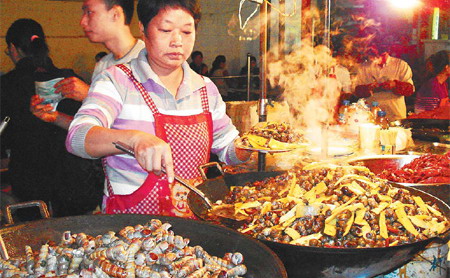Raymond Zhou
Gastropod gastronomy
Updated: 2009-11-27 11:23
By Raymond Zhou (China Daily)
|
|
But how delicious they are! And Nanning, in Guangxi Zhuang autonomous region, is a paradise for connoisseurs, like me.

Along 300 m of northern Zhongshan Road, near Yongjiang Bridge, shops and food stands open as dusk falls and the street is closed to vehicles.
Food tables are lined up from one end to the other. All kinds of wonderful foods are available, from a type of Indian pizza to Beijing chestnuts.
What attracts me the most is the snails (called luo in Chinese) that are displayed in big woks close to the center of the street and its swarming epicureans.
Welcome to Zhongshan Road Night Market, which sells nothing but mouth-watering refreshments. Almost every stand has the same three types of snails - an elongated seashell snail, a small freshwater snail, and a larger kind found in rice paddies, the paddy snail.
I grew up eating the river snail. It sticks to stones and the foundations of riverside houses and docks. When I was a teenager, I used to dive down and try to get as many as possible. Most times I barely got enough for one serving.
| ||||
After cutting open the "head", the pointed part of the shell, I'd rinse it a few more times. I'm told that it's best to clean for a couple of days, but surely most businesses don't do this.
A restaurateur tells me that, unlike oysters, his snails are all "wild", not grown on farms. They are easy to harvest because they are, as the proverb suggests, slow. And they are available in large quantities, contributing to their low status on the food chain.
Machines now cut the shells, I was informed, but many river snail shells are not cut, which makes them uneatable. The flesh shrinks and it is unreachable, even by toothpick.
Chili powder is sprayed in the water to expedite cleansing. It's all done in one day and the half-processed snails are sold to food stands along the street.
On a typical day, an eatery sells about 50 kg of each type of snails. One portion weighs about 1 kg. It costs 12 yuan ($1.8), or slightly higher.
I'm always in a dilemma when I have a yen for snails. Not many street stands in the cities I've lived serve them, and though cheap their hygiene cannot be guaranteed. Few food courts serve them, and when available they "taste like wax", as we Chinese say. Restaurant snails look clean, but generally they have not been marinated long enough.
Nanning offers the best compromise: It has the cleanliness of a regular restaurant, combined with the tastiness of offerings from a Guangzhou greasy spoon. If I were a local resident, I would go every week.
I have wondered why Chinese snails are not so highly prized as French escargots. One reason is the large portion. A plate of freshwater snails takes half an hour for one person to finish. The process resembles munching melon seeds, which is not really a high-class undertaking.
At a French restaurant there is more likely to be a plate of just six or so fancily presented snails.
I saw some young ladies on Zhongshan Road wearing plastic gloves and, with a toothpick, daintily attacking the innards of a shell.
This appeared more elegant but gloves are not the best way to suck meat. I've realized the fun is in putting your mouth to the shell and savoring the soup that drenches the snail's head. It's a morsel with a variety of textures.
Given time, snails will claim their rightful status as a bonne bouche, but the irony is they do not yield to a refined way of eating. So, while in Nanning, set aside your aristocratic manners and suck away.
Specials

President Hu visits the US
President Hu Jintao is on a state visit to the US from Jan 18 to 21.

Fossil mom helps shed light on ancient life
The discovery of the fossile of a female pterosaur nicknamed as Mrs T and her un-laid egg are shedding new light on ancient mysteries.

Economic figures
China's GDP growth jumped 10.3 percent year-on-year in 2010, boosted by a faster-than-expected 9.8 percent expansion in the fourth quarter.




